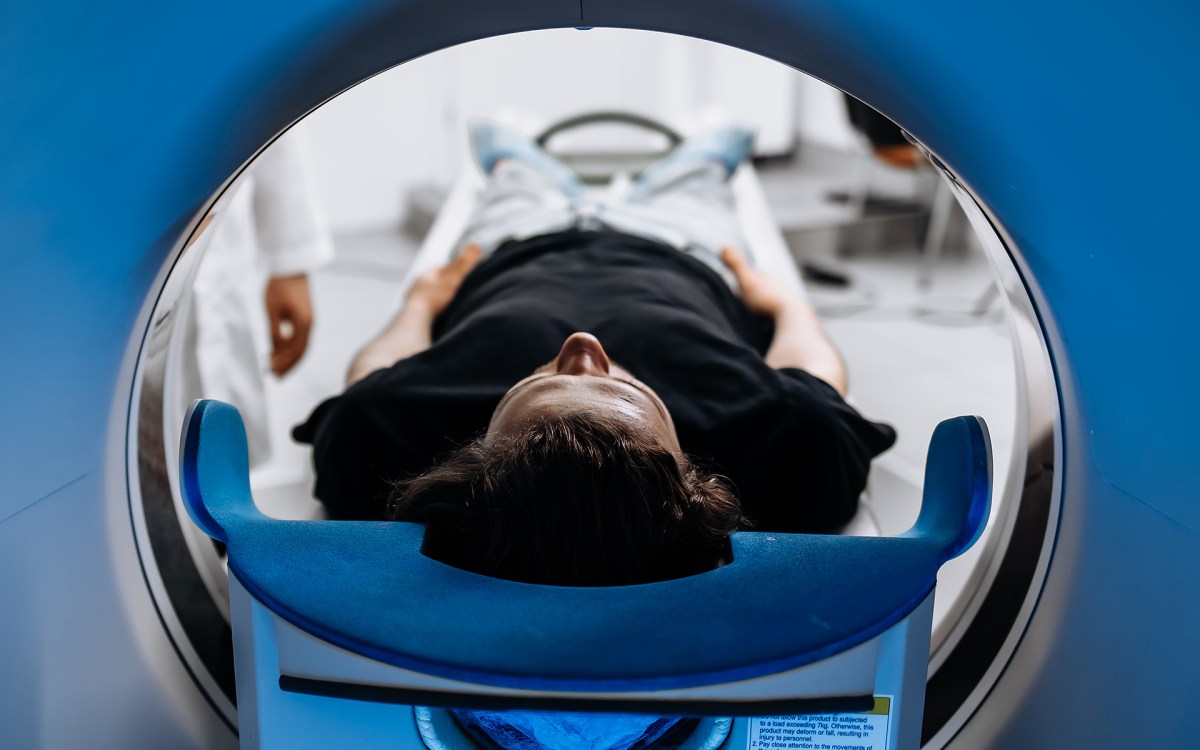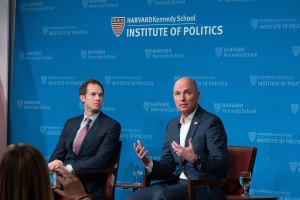Tag: Research
-
Health
Noninfectious pathway for HIV found by HSPH team
HIV is a crafty virus. It attacks the body by invading and taking over the very cells meant to protect humans from infection. Hiding within cells such as macrophages and lymphocytes, the virus uses the body’s natural machinery to replicate itself, destroying the immune system and leaving patients open to a range of debilitating and…
-
Nation & World
Stem cells, through a religious lens
Representatives of three of the world’s major religions tangled over the beginnings of human life, the disposal of surplus embryos from in vitro fertilization clinics, and the conduct of embryonic stem cell research Wednesday (March 14) at Harvard Divinity School. Panelists at the event, representing Christianity, Judaism, and Islam, each briefly presented their faith’s teachings…
-
Health
Vitamin D may protect against prostate cancer
With spring on the way, Harvard researchers advise men to get more sun, supplements, and seafood. All are good sources of vitamin D, and a large, lengthy study suggests the vitamin reduces risk of prostate cancer.
-
Health
Jane Goodall: A life in the field
As a girl in England, Jane Goodall had a toy chimpanzee named Jubilee — a harbinger of the primatologist she was to become and of the jubilant audiences that greet her at every turn in adulthood. Beginning in 1960, her groundbreaking studies of chimpanzees in the African wild led to a series of revelations that…
-
Health
Brugge, colleagues urge Senate to increase NIH funding
Testifying Monday afternoon (March 19) before a U.S. Senate committee hearing on National Institutes of Health (NIH) funding, Harvard Medical School Cell Biology Department Chair Joan S. Brugge warned that “four years of flat [NIH] funding have had a devastating impact on the trajectory of cancer research,” threatening “the rapid progress in developing effective and…
-
Science & Tech
Prof. Lene Hau: Light matters
In 2007, Professor Hau expanded upon her ’05 light-stopping breakthrough by transforming light into matter, and then back again.
-
Health
High-deductible health plans are linked to fewer ER visits
Patients who switched to high-deductible health plans went to the emergency department 10 percent less than patients who remained in traditional plans, according to a new study by the Department of Ambulatory Care and Prevention (of Harvard Medical School and Harvard Pilgrim Health Care). The study, published in the March 14 Journal of the American…
-
Health
Study questions ‘cancer stem cell’ hypothesis in breast cancer growth
A Dana-Farber Cancer Institute study challenges the hypothesis that “cancer stem cells” — a small number of self-renewing cells within a tumor — are responsible for breast cancer progression and recurrence, and that wiping out these cells alone could cure the disease.
-
Nation & World
Can science, religion coexist in peace?
Almost 14 billion years after the big bang, and 3.5 billion years since the first bacteria appeared on Earth, humans occupy just one branch of the tree of life. We share an evolutionary limb with other eukaryotes, creatures whose membrane-bound cells carry genetic material. Our biological neighbors developed over time just as we did, by…
-
Health
Indonesia’s strategies to fight bird flu run afoul of reality
If Indonesia is able to execute a comprehensive bird flu plan written by the government, it will take great strides toward controlling the outbreak in the sprawling island nation, a visiting professor who has studied the region said Friday (March 9). Unfortunately, there’s little chance of that happening.
-
Health
Sleep found to repair and reorganize the brain
Most of us do it every night but we don’t know why. If you miss too many nights, it might kill you. We know why we eat, drink, breathe, and move around, but no one can explain why we need to sleep. What does seven or eight hours of snoozing really do for us? Van…
-
Health
HSPH study suggests taking wraps off drug safety data
For years, pharmaceutical companies have sought to restrict public access to drug safety data collected in clinical trials on the basis that it is proprietary information, arguing that competitors could use that information in the development of their own products. However, a number of recent cases of drugs found to have dangerous side effects after…
-
Health
Despite their heft, many dinosaurs had surprisingly tiny genomes
They might be giants, but many dinosaurs apparently had genomes no larger than those of a modern hummingbird. So say scientists who’ve linked bone cell and genome size among living species and then used that new understanding to gauge the genome sizes of 31 species of extinct dinosaurs and birds, whose bone cells can be…
-
Health
I know just how you feel
When people talk with psychotherapists, the best results occur if both feel similar emotions, when both “like” each other. But do most therapists really connect with patients this way? No one has ever tried to directly measure the biology of empathy between the two.
-
Health
At Radcliffe, microbiologist explains ‘biocomplexity’
The scientist who revolutionized the study of cholera paid a visit to Harvard this week. On March 6, microbiologist and oceanographer Rita R. Colwell, a Johns Hopkins University public health researcher, delivered the last in a series of science talks in the 2006-2007 Dean’s Lecture series at the Radcliffe Institute for Advanced Study.
-
Health
Obesity runs in families – and friends, too
Having overweight family and friends increases the likelihood someone will become overweight, according to a Harvard researcher who examined obesity and social network data from the long-running Framingham Heart Study.
-
Health
Seeing the forest, from the trees
Alain Houle thinks higher-status chimpanzees likely feed on more, higher-quality fruit — found higher up in the tree — than lower-status chimpanzees, which leads to the chimps being in better physical shape and greater breeding success. “I thought I’d be killed,” Houle said later. “They climbed up, looked at me, barked at me, and then…
-
Arts & Culture
Undergrad grants available through Schlesinger Library
The Arthur and Elizabeth Schlesinger Library on the History of Women in America invites Harvard undergraduates to make use of the library’s collections with competitive awards (ranging from $100 to $2,500) for relevant research projects.
-
Health
Common prostate cancer therapy may carry risks
Androgen deprivation therapy – one of the most common treatments for prostate cancer – may increase the risk of death from heart disease in patients over age 65, according to a new study by researchers at Dana-Farber Cancer Institute, Brigham and Women’s Hospital, and other institutions.
-
Nation & World
Young scholars show findings at HGSE Student Research Conference
In a basement classroom in Larsen Hall on Friday (Feb. 23), there was everything young learners need: chalkboards, a screen, bright lights, sturdy chairs – and good teachers. In this case, four good teachers – all of them Ed.M. students at the Harvard Graduate School of Education (HGSE). The four were among 230 young scholars…
-
Health
Over-the-counter pain relievers increase the risk of high blood pressure in men
Researchers from Brigham and Women’s Hospital (BWH) have found that the three most commonly used drugs in the United States, acetaminophen, ibuprofen, and aspirin, increase the risk of developing high blood pressure in middle-aged men. These findings are published in the Feb. 26 issue of the Archives of Internal Medicine.
-
Science & Tech
Medieval Islamic architecture presages 20th century mathematics
Intricate decorative tilework found in medieval architecture across the Islamic world appears to exhibit advanced decagonal quasicrystal geometry – a concept discovered by Western mathematicians and physicists only in the 1970s and 1980s. If so, medieval Islamic application of this geometry would predate Western mastery by at least half a millennium.
-
Health
Harvard athletes grow bigger, better hearts
Strenuous exercise can cause a heart to grow as much as 10 percent and its chambers to enlarge, Harvard researchers have discovered after testing the University’s athletes. What they are learning from these studies could someday be applied to advising nonathletes about caring for their hearts.
-
Science & Tech
Jackson raps abundance of ‘experts’
In 1973, Shirley Ann Jackson became the first black woman to receive a Ph.D. in physics from the Massachusetts Institute of Technology. Decades – and 38 honorary degrees – later, Jackson is the president of Rensselaer Polytechnic Institute in upstate New York. Her resume includes time as a university researcher (in theoretical elementary particle physics);…
-
Campus & Community
Undergrad grants available through Schlesinger Library
The Arthur and Elizabeth Schlesinger Library on the History of Women in America invites Harvard undergraduates to make use of the library’s collections with competitive awards (ranging from $100 to $2,500) for relevant research projects.
-
Campus & Community
William Berenberg
William Berenberg was born October 29, 1915, in Haverhill, Mass. He moved to Chelsea at a young age and was educated in the public high school before attending Harvard College as a day student. There he participated in basketball and baseball and was a member of the Phillips Brooks House. He compiled an excellent academic…
-
Health
Adjusting to death of a loved one
“Is my grief normal?” That is one of the most common questions posed by people who have lost a loved one. A new study by Dana-Farber Cancer Institute researchers has helped answer that question by affirming the commonly accepted stages of grief – disbelief, yearning, anger, depression, and acceptance – and the sequence in which…
-
Health
Stem cell research sheds light on organ regeneration
The rules governing mammalian organ repair and regeneration are so widely varied as to suggest at first glance that there are no rules: Blood has such an enormous regenerative capacity that you can literally give it away by the pint and be none the worse for wear; rip a hole in your skin and new…


